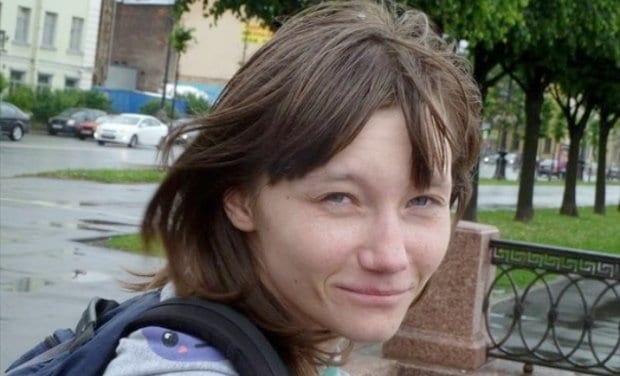A Russian court has acquitted Elena Klimova of violating the country’s anti-propaganda law for administrating two social-media groups that support gay teenagers.
Klimova, a journalist and creator of the online project Children 404, was acquitted by the Dzerzhinskii district court of Nizhny Tagil in March.
“When I was in court I had no hope that I would be cleared,” Klimova says. “Charges based on this law were brought to court three times, and the accused were fined all three times. What happened in my case is a huge accident. I got lucky that the judge was a normal, healthy-thinking person.”
The first person to be convicted under the law, 24-year-old activist Dmitry Isacov, was fined 4,000 rubles (approximately $120) for staging a single-man picket with a banner that read, “Being gay and loving gays is normal. Beating gays and killing gays is a crime!”
Two other gay activists, Nikolai Alexeyev and Yaroslav Yevtushenko, were also fined 4,000 rubles each for picketing outside of a children’s library in the northwestern city of Arkhangelsk, with banners that read “Gays are not made, they’re born.”
Alexander Suturin, editor of a weekly newspaper in the town of Khabarovsk, was fined 50,000 rubles (almost $1,600) for publishing an interview with an openly gay geography teacher.
According to Klimova, she was acquitted because the court found her work did not contain propaganda. LGBT Network staff lawyer Maria Kozlovskaya demonstrated that Klimova’s actions, which consist of administrating groups on social networks Vkontakte and Facebook, do not violate the law as Klimova is not writing the content herself.
Klimova also received support from local psychotherapist Dmitry Vinokurov, who volunteered to testify as an expert witness. Vinokurov testified that Klimova’s work does not contain propaganda and is helpful for teenagers who are struggling because of their sexual orientation or gender identity.
The case was brought to court as a result of a complaint by Vitaly Milonov, the Russian politician who first proposed the anti-gay propaganda law. Milonov attempted to file an appeal but was denied.
“The most scary thing was that we would have been forced to close the social media groups,” Klimova says. “But now it is safe, and there is nothing anyone can do to shut us down.”
***
When Klimova began writing about issues facing gay Russians in February 2013, she had no idea her work would get such a strong response. After she published her first piece on the topic, she was contacted by a 15-year-old girl.
“She found me online and wrote me that she had read my article and was deeply affected. She had thought about committing suicide because of bullying she faced at school and problems with her mother. She said my article gave her hope,” Klimova recalls. “This made me realize that LGBT teens in Russia have no access to information or support. It is as if they do not exist. And that’s what gave me the concept for Children 404.”
Children 404 was meant to be a short-term project. Klimova reached out to LGBT teens, asking them to describe personal experiences in letters and to provide photographs. “The main objective was to publish the letters in social media groups so that adults, especially those responsible for the anti-gay laws, could read them and reflect on what was going on,” she explains. “I wanted the lawmakers to realize that the measures put in place to protect the next generation are in fact crippling children.”
Unfortunately, this objective was not met. “It is sad, but they do not want to understand that there is no such thing as gay propaganda,” Klimova says. “I have switched the focus to providing psychological support for the children, which is also very important.”
Today, Klimova has 10 psychologists on her roster. “Some of the kids just send me a letter that they want to see published, others just want me to talk to them, and others ask for psychological support,” she explains. “The psychologists I work with provide this support for free.”
Since Klimova launched Children 404, she has been devoting the bulk of her time to sustaining the project. “I thought I would stop receiving letters after one or two months, but it has been over a year, and I still get 10 to 12 letters per day.”
Klimova is now working on an independent website. “The website will include the letters I receive, a library with books on homosexuality, and contacts for psychologists,” she says. “It will be impossible to close because it will be hosted abroad. Now I do not have to be scared. I know the project will live.”
She is also writing a book about LGBT teenagers, which she hopes to complete over the next few months.
***
Klimova’s project inspired Russian filmmakers Pavel Loparev and Askold Kurov to create a documentary with the same title.
Because of the unfriendly political climate in Russia, the filmmakers could not raise the funds for the project at home. They contacted Cinema Politica, a Montreal-based grassroots film-distribution network, for support. Cinema Politica’s founders, Svetla Turnin and Ezra Winton, spearheaded a fundraising campaign for the film on Indiegogo, raising $10,000.
“We took on the campaign both because it was a safety issue for the directors to fundraise at home, and as a solidarity issue,” Winton says. “The film highlights the importance of international solidarity for projects around rights issues. It also highlights the need for people in more privileged positions to support artists’ work that depicts oppression and resistance in the world.”
The film will focus on the story of Pasha, an 18-year-old gay boy who, after facing harassment and intimidation, became an LGBT activist and recently emigrated to Canada.
It will also include interviews with Klimova, young LGBT people, parents, psychologists, teachers and priests. The film will premiere at the 2014 Hot Docs International Documentary Festival in Toronto in April.

 Why you can trust Xtra
Why you can trust Xtra


